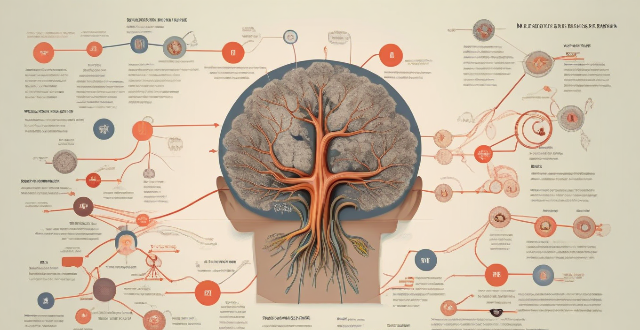Mental Anxiety

Can climate change exacerbate mental health issues such as depression and anxiety ?
Climate change can exacerbate mental health issues such as depression and anxiety through various pathways, including extreme weather events, displacement and loss of home, food insecurity, and economic stress. It is crucial for policymakers and healthcare professionals to recognize the connection between climate change and mental health and implement strategies to mitigate the adverse effects of climate change on mental well-being.

How does environmental stress from climate change influence mental health disorders such as anxiety and depression ?
Climate change is a global issue that not only affects the environment but also has significant implications for human health, including mental health. Environmental stress from climate change can exacerbate existing mental health disorders such as anxiety and depression or even trigger new ones. One of the most direct ways in which climate change impacts mental health is through increased exposure to natural disasters such as hurricanes, floods, wildfires, and heatwaves. These events can cause traumatic experiences, loss of homes and communities, displacement, and financial hardship, all of which are risk factors for developing mental health disorders like anxiety and depression. Climate change affects ecosystem services, such as air and water quality, food production, and outdoor recreational opportunities, all of which have been linked to mental well-being. The socioeconomic impacts of climate change, such as job loss in industries affected by climate policies or extreme weather events, can lead to financial insecurity and social disruptions that exacerbate mental health conditions. Anticipatory anxiety about the potential consequences of climate change can also contribute to chronic stress and exacerbate anxiety and depressive symptoms. Coping mechanisms and building resilience are essential for managing the psychological impacts of environmental stress.

How can sport psychology counseling help with mental health issues such as anxiety and depression in athletes ?
Sport psychology counseling is a valuable resource for athletes dealing with mental health issues such as anxiety and depression. It involves understanding the problem, setting goals, managing stress, building confidence, developing emotional intelligence, and fostering social support. Tailored approaches, consistency, and patience are key to achieving long-term success in improving both mental well-being and performance.

How can athletes manage pre-game nerves and anxiety ?
Pre-game nerves and anxiety are common for athletes but can be managed through various strategies, including mindfulness techniques, physical preparation, mental strategies, support systems, and practice. These methods help athletes perform at their best by transforming nervous energy into focus and drive for success.

How do sports psychologists help athletes deal with performance anxiety ?
Sports psychologists use various techniques to help athletes manage performance anxiety, including assessment and goal setting, cognitive behavioral techniques, building mental toughness, establishing routines, fostering social support, and ongoing assessment. These strategies aim to enhance an athlete's mental resilience and enable them to perform optimally under pressure.

What are the best exercises for improving mental health ?
Engaging in regular physical activities is crucial for maintaining good mental health. Some of the best exercises for improving mental health include cardiovascular exercises like running, cycling, and swimming; strength training exercises like weightlifting, resistance bands, and bodyweight exercises; and yoga and meditation practices like Hatha yoga, mindfulness meditation, and Tai Chi. By incorporating these exercises into your routine, you can reduce stress and anxiety levels while also improving overall well-being.

Does exercise have a greater impact on mental health than meditation ?
Exercise and meditation are both beneficial for mental health, but it is difficult to determine which has a greater impact. Exercise can reduce stress and anxiety, improve self-esteem and cognitive function, and promote better sleep. Meditation can also reduce stress and anxiety, improve emotional regulation and self-awareness, and promote positive thinking. The effectiveness of each practice may vary depending on individual preferences and circumstances. It is important to choose a practice that suits your needs and engage in it regularly for optimal results.

How do celebrities deal with stress and anxiety in their daily life ?
Celebrities handle stress and anxiety through exercise, meditation, yoga, healthy eating, hobbies, social support, professional help, time management, limiting social media exposure, and self-care routines.

Can regular physical activity reduce anxiety levels ?
Regular physical activity can help reduce anxiety levels by improving mood, reducing stress hormones, promoting better sleep, increasing self-esteem and confidence, and providing social support. Engaging in at least 30 minutes of moderate-intensity exercise per day can significantly reduce anxiety symptoms.

How much exercise is needed to reduce anxiety and depression symptoms ?
Exercise has been shown to reduce anxiety and depression symptoms, with moderate-intensity aerobic exercise for at least 150 minutes per week being effective. However, individual factors such as age, gender, health condition, and lifestyle can affect the amount of exercise needed. It is important to choose enjoyable and sustainable activities for long-term use, and seek professional help if struggling with mental health issues.

How does engaging in sports activities aid in overcoming anxiety ?
Engaging in sports activities is beneficial for mental health, especially in reducing anxiety. It provides distraction from worries, increases endorphin levels, offers social support, improves self-esteem and confidence, and promotes better sleep quality. Incorporating physical activity into your routine can help manage anxiety effectively.

Can regular physical activity help in reducing stress and anxiety ?
Regular physical activity can help reduce stress and anxiety by promoting the release of endorphins, improving sleep quality, and boosting self-esteem. Aerobic exercises like running, swimming, or cycling are particularly effective because they increase heart rate and circulation, leading to improved oxygenation of the brain. Yoga and tai chi focus on breathing and relaxation techniques that can also help reduce stress and anxiety. The American Heart Association recommends at least 150 minutes of moderate-intensity aerobic exercise or 75 minutes of vigorous-intensity aerobic exercise per week for adults. Finding an exercise routine that works for you and that you enjoy is key to sticking with it over time.

Can exercise physiology help in managing stress and anxiety levels ?
Exercise physiology plays a significant role in managing stress and anxiety levels by promoting various physiological responses that counteract the negative effects of these conditions on the body. By incorporating regular physical activity into your lifestyle, you can improve your overall mental well-being and reduce the impact of stress and anxiety on your daily life.

Is it normal to experience anxiety before an exam ?
Is it normal to experience anxiety before an exam? Yes, it is absolutely normal to experience anxiety before an exam. In fact, it's a common reaction that many students face. This feeling of unease or nervousness is often referred to as "test anxiety" or "exam stress." Let's delve into this topic further: Understanding Exam Anxiety Exam anxiety can manifest in various ways, such as physical symptoms like sweating, trembling hands, or a racing heartbeat. Mental symptoms like difficulty concentrating or thinking negatively about the exam are also common. Emotional symptoms like feeling overwhelmed or fearful may also occur. Why Does It Happen? Several factors can contribute to exam anxiety, including performance pressure, lack of preparation, past experiences, and perfectionism. Coping with Exam Anxiety There are several strategies to manage exam anxiety effectively, such as adequate preparation, relaxation techniques, positive self-talk, time management, and maintaining a healthy lifestyle. Seeking Support If your anxiety is severe or persistent, consider seeking support from tutoring, study groups, or professional help. Final Thoughts Remember, it's okay to feel anxious before an exam. Acknowledge your feelings without judgment and utilize the strategies mentioned above to manage your anxiety. With preparation and the right mindset, you can approach your exams with confidence and competence.

Can team sports help with social anxiety ?
Team sports can potentially help individuals with social anxiety by providing a supportive environment for exposure therapy, building confidence, offering positive reinforcement, distracting from self-consciousness, and developing social skills. However, professional guidance should be sought if social anxiety significantly impacts one's life.

Is there a way to completely eliminate test anxiety ?
Test anxiety is a common problem that affects many students. It can cause physical symptoms such as sweating, trembling, and rapid heartbeat, as well as mental symptoms such as difficulty concentrating and negative thoughts. While it may not be possible to completely eliminate test anxiety, there are several strategies that can help reduce its impact. Understanding Test Anxiety Test anxiety is the feeling of worry or fear that comes before or during an exam. It is a type of performance anxiety, which means it is related to how well you think you will do on the test. The more importance you place on the test, the more anxious you are likely to feel. Strategies for Reducing Test Anxiety Preparation is key to reducing test anxiety. Make sure you have studied thoroughly and understand the material. Create a study schedule and stick to it. This will help you feel more confident and prepared when the test day arrives. Positive thinking can also help reduce test anxiety. Try to replace negative thoughts with positive ones. For example, instead of thinking "I'm going to fail," try saying "I am prepared and I can do this." Visualize yourself succeeding on the test. Relaxation techniques such as deep breathing, meditation, or progressive muscle relaxation can help reduce anxiety. Practice these techniques regularly, not just on the day of the test. Time management is important for reducing test anxiety. Make sure you have enough time to complete the test. Don't wait until the last minute to start studying. Also, manage your time during the test by allocating a certain amount of time for each section. Maintaining a healthy lifestyle can also help reduce test anxiety. Get enough sleep, eat a balanced diet, and exercise regularly. Avoid caffeine and sugar, which can increase anxiety. If your test anxiety is severe, seek support from a counselor or therapist who specializes in anxiety disorders. They can provide additional coping strategies and treatments such as cognitive-behavioral therapy (CBT). Conclusion While it may not be possible to completely eliminate test anxiety, there are several strategies that can help reduce its impact. By understanding test anxiety, preparing thoroughly, practicing positive thinking and relaxation techniques, managing your time effectively, maintaining a healthy lifestyle, and seeking support if needed, you can minimize the effects of test anxiety and improve your performance on exams.

How can I distinguish between normal nervousness and excessive test anxiety ?
Normal nervousness is a natural response to stress, while excessive test anxiety can have negative effects on performance and well-being. Signs of excess test anxiety include excessive worry, avoidance behavior, physical symptoms, negative self-talk, and behavioral changes. Seeking help from a trusted source can provide guidance and support to manage anxiety and improve performance.

What are the most common mental health issues faced by women ?
Women can experience a range of mental health issues throughout their lives, with some conditions being more commonly reported among them. These include depression, anxiety disorders, eating disorders, posttraumatic stress disorder (PTSD), perinatal depression and anxiety, premenstrual dysphoric disorder (PMDD), and borderline personality disorder (BPD). The prevalence and presentation of these issues can be influenced by cultural, societal, and biological factors, as well as access to care and societal stigma.

Are there specific exercises that help improve mental health ?
Exercises like yoga, meditation, aerobic exercise, resistance training, MBSR, and Tai Chi can help improve mental health by reducing stress, anxiety, and depression symptoms while promoting relaxation, self-awareness, and social interaction.

What impact has the pandemic had on mental health and well-being ?
The COVID-19 pandemic has significantly impacted mental health and well-being, leading to increased stress, anxiety, depression, insomnia, and substance misuse. Factors such as fear of infection, financial instability, social isolation, grief, and disruption of daily routines contribute to these issues. The situation emphasizes the need for accessible mental health services and support systems to address psychological needs during this challenging period.

How does sports psychology help in managing pre-game anxiety and nervousness ?
Pre-game anxiety and nervousness are common experiences for athletes, but sports psychology offers strategies to manage these emotions effectively. These include goal setting, relaxation techniques, cognitive restructuring, establishing routines, practicing mindfulness, and leveraging social support. By implementing these tools, athletes can enhance their mental resilience and perform at their best when it matters most.

In what ways does poor personal hygiene impact mental health ?
Poor personal hygiene can negatively affect mental health by causing decreased self-esteem, social isolation, and exacerbating symptoms of mental health disorders. It is important to maintain good hygiene habits for overall well-being.

How does climate change affect children's mental wellbeing ?
Climate change has a significant impact on children's mental wellbeing, leading to anxiety, fear, emotional distress, grief, and loss. However, by educating children about the issue, providing access to mental health services, and building strong communities, we can help mitigate these effects and support children's overall wellbeing.

How does exercise improve mental health ?
The article discusses how exercise improves mental health by reducing symptoms of depression and anxiety, improving mood, and enhancing cognitive function. It highlights the release of endorphins, regulation of neurotransmitters, stress reduction, increased energy levels, better sleep quality, enhanced self-esteem, improved memory and attention, reduced risk of cognitive decline, and promotion of neuroplasticity as mechanisms through which exercise positively impacts mental well-being. The conclusion emphasizes the importance of regular physical activity for overall well-being and advises consulting a healthcare professional before starting any new exercise program.

How can I overcome fear and anxiety in sports competitions ?
Fear and anxiety in sports competitions can be managed through preparation, mindset adjustments, relaxation techniques, a strong support system, and consistent routines. By focusing on training, visualization, goal setting, positive self-talk, acceptance, deep breathing, progressive muscle relaxation, meditation, coaching, teammate support, family and friend encouragement, pre-competition routines, healthy habits, and post-competition analysis, athletes can improve their performance and enjoyment of the game.

How does climate change impact mental health ?
Climate change has a multifaceted impact on mental health, including direct effects such as trauma from extreme weather events and environmental degradation, and indirect effects like economic strain and social disruption. Mitigating this impact involves raising awareness, strengthening community resilience, investing in mental health services, advocating for policies that address both climate change and public health concerns, and encouraging sustainable practices.

What are the effects of domestic violence on women's mental health ?
Domestic violence has severe and long-lasting impacts on women's mental health, including depression, anxiety, post-traumatic stress disorder (PTSD), and substance abuse. It is crucial for healthcare providers to screen for signs of domestic violence and provide appropriate support services for affected women.

What role does physical exercise play in boosting mental focus ?
Physical exercise is not only beneficial for our physical health, but it also plays a crucial role in enhancing mental focus. Here's how: 1. Release of Endorphins: Regular exercise triggers the release of endorphins, which can help reduce stress and anxiety, leading to improved mental clarity and focus. 2. Increased Blood Flow to the Brain: Engaging in physical activities increases blood flow to the brain, delivering more oxygen and nutrients. This increased blood flow can help improve cognitive function, memory, and overall mental sharpness. 3. Better Sleep Quality: Exercise has been shown to promote better sleep quality and duration. Adequate sleep is essential for maintaining mental focus and concentration throughout the day. 4. Reduction of Stress and Anxiety: Physical activity helps lower levels of the body's stress hormones, such as cortisol. By reducing stress and anxiety, exercise allows individuals to maintain a clearer mind and stay focused on tasks at hand. 5. Enhanced Self-Confidence and Mood: Regular exercise can boost self-esteem and confidence, leading to a positive outlook on life. A positive mindset contributes to better mental focus and productivity. 6. Improved Cognitive Function: Studies have found that regular physical exercise can lead to improvements in various aspects of cognitive function, including attention, memory, and executive functions. These cognitive enhancements directly contribute to increased mental focus and concentration.

How does nutrition impact women's mental health ?
Nutrition has a significant impact on women's mental health. Eating a balanced diet with adequate amounts of vitamins, minerals, and nutrients can help improve mental health. Avoiding processed foods and sugary drinks, drinking enough water, eating breakfast regularly, and getting enough sleep are also essential for good mental health. By taking care of their bodies through nutrition, women can take care of their minds.